|
|
|
Sort Order |
|
|
|
Items / Page
|
|
|
|
|
|
|
| Srl | Item |
| 1 |
ID:
098126


|
|
|
| 2 |
ID:
130601
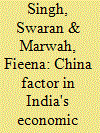

|
|
|
|
|
| Publication |
2014.
|
| Summary/Abstract |
The technology driven time-and-space shrink in recent decade have turned open oceans from barriers to bridges. This has opener new frontiers for trade and transportation, for resource exploitation as also for adventurous scientific explorations into the history 0 human evolution as also into our future. This recent paradigm shift is distinct from the discovery of steam ship leading to naval fleets ancient colonialism in the 19"'century which was focused not only on European powers' control and exploits but also on continental humarjand material resources of their colonies across the world. The recent maritime discourses have instead opened up enormous new avenue entities even to achieve their basic national development and security objectives.
|
|
|
|
|
|
|
|
|
|
|
|
|
|
|
|
| 3 |
ID:
193026
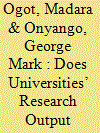

|
|
|
|
|
| Summary/Abstract |
Few studies on developing countries have investigated the alignment of research output to a country’s development agenda and economic productivity. Using evidence from Kenya, this study sought to empirically determine whether the country’s research output is aligned to its development agenda in the first instance and to establish the output’s relationship to economic productivity. Journal publications were used to measure research output. From the analysis, 86% of the publications fell within one or more of the national development priority areas, though 60% were in only 6 of the 35 areas. Several areas had no publications at all during the period under investigation. Furthermore, excluding the health and education sectors, a strong positive relationship was established between the number of publications in different priority areas and those areas’ contribution to Gross Domestic Product. The Government, therefore, needs to avail research funding to research institutions, which, in turn, need to focus their research effort on all identified national development priority areas if Kenya’s development aspirations are to be achieved and the desired economic growth attained.
|
|
|
|
|
|
|
|
|
|
|
|
|
|
|
|
| 4 |
ID:
102756
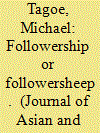

|
|
|
|
|
| Publication |
2011.
|
| Summary/Abstract |
The recent interest in transformational leaders is based on the fact that this type of leadership is change-oriented and focuses on followership development. In Ghana, a long history of failed development strategies and different political leadership styles has left the citizens disappointed in their leaders. This paper argues that Ghana needs transformational leaders who will be able to raise the quality of life of its citizens. Political leaders need to structurally transform the economic base, deal with corruption, and accelerate the pace of empowerment of ordinary Ghanaians through an effective decentralization programme.
|
|
|
|
|
|
|
|
|
|
|
|
|
|
|
|
| 5 |
ID:
099054
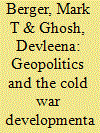

|
|
|
|
|
| Publication |
2010.
|
| Summary/Abstract |
Contrary to the view of some observers who insist that the Cold War was of limited or no relevance to the transition from colonies to nation-states after 1945 we argue that the geopolitics of the Cold War played a crucial role in shaping the character and direction of the trajectories of nation-states in Asia, if not the erstwhile Third World as a whole. More particularly, the geopolitics of the Cold War provided the crucial backdrop for the rise and fall of developmental nationalism, while the post-Cold War era has set the scene for an array of cultural nationalisms. These issues are explored with a particular focus on India. The case of India makes clear that it is impossible to separate the emergence of new nation-states and their success or failure after 1945 from the geopolitics of the Cold War. It will also make clear that the shifting geopolitics of the end of the Cold War reinforced the demise of developmental nationalism. Since the late 1980s, the problems facing the nation-states of the former Third World, are being played out in a geo-political context, which includes an important shift from developmental nationalisms to cultural nationalisms, while the nation-state system itself is sliding deeper into crisis against the backdrop of the global framework of 'genuinely existing' liberal capitalism and the changing geopolitics of the early twenty-first century.
|
|
|
|
|
|
|
|
|
|
|
|
|
|
|
|
| 6 |
ID:
127483
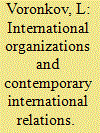

|
|
|
|
|
| Publication |
2013.
|
| Summary/Abstract |
SOVEREIGN STATES traditionally build their relationships with external actors and partners in the interest of creating a favorable international environment for the effective achievement of national goals. The foreign policy of states performs a very important, but mainly an auxiliary function in dealing with their internal problems.
In recent decades, due to the growing interdependence of modern states, the internationalization of their life and the deepening of globalization processes, the significance of international factors for successfully dealing with national matters of individual states has increased markedly. International and domestic aspects of their policies are becoming more organically interlinked. This induces states to look for ways to raise their role in shaping a favorable international environment for national development.
|
|
|
|
|
|
|
|
|
|
|
|
|
|
|
|
| 7 |
ID:
126650
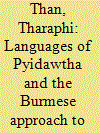

|
|
|
|
|
| Publication |
2013.
|
| Summary/Abstract |
Burma's first well known welfare plan was entitled Pyidawtha or Happy Land, and it was launched in 1952. In vernacular terms, the literal meaning of Pyidawtha is 'Prosperous Royal Country'. The government's attempt to sustain tradition and culture and to instil modern aspirations in its citizens was reflected in its choice of the word Pyidawtha. The Plan failed and its implications still overshadow the development framework of Burma. This paper discusses how the country's major decisions, including whether or not to join the Commonwealth, have been influenced by language; how the term and concept of 'development' were conceived; how the Burmese translation was coined to attract public support; and how the detailed planning was presented to the masses by the government. The paper also discusses the concerns and anxieties of the democratic government led by U Nu in introducing Burma's first major development plan to a war-torn and bitterly divided country, and why it eventually failed.
|
|
|
|
|
|
|
|
|
|
|
|
|
|
|
|
| 8 |
ID:
130694
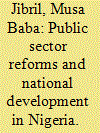

|
|
|
| 9 |
ID:
113101
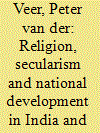

|
|
|
|
|
| Publication |
2012.
|
| Summary/Abstract |
This article addresses the question of the relationship between religion and national development in India and China. It argues that instead of looking at secularisation as a necessary process in national development, one should focus on secularism as a powerful project of intellectuals and the state in these societies. In the post-colonial period, anti-consumerism in China took the form of Maoist secular utopianism, while in India it took the form of Gandhian religious utopianism. The article argues that religious elements can be found in both Indian and Chinese secularisms.
|
|
|
|
|
|
|
|
|
|
|
|
|
|
|
|
| 10 |
ID:
101032
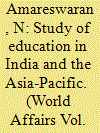

|
|
|
|
|
| Publication |
2010.
|
| Summary/Abstract |
Education is a vital foundation for individual and national development. India has one of the oldest educational traditions and academic systems and yet it has large percentage of all illiterate people in the world. This article compares the elementary and higher education infrastructures and institutions in India, China and the Asia - Pacific region. At the end , it provide suggestions and recommendations to improve the efficiency and quality of learning and training methods and processes in developing countries while highlighting the critical importance of imparting sound values.
|
|
|
|
|
|
|
|
|
|
|
|
|
|
|
|
| 11 |
ID:
130467
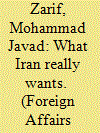

|
|
|
|
|
| Publication |
2014.
|
| Summary/Abstract |
Foreign policy is a critical component in the lives, conduct, and governance of all nation-states. But it has become even more significant in recent years as interstate relations have grown ever more complex. The inexorable rise in the number of international players -- including multilateral organizations, nonstate actors, and even individuals -- has further complicated policymaking. Meanwhile, the ongoing process of globalization -- however conceived and defined, whether lauded or despised -- has brought its inescapable weight to bear on the foreign policies of all states, whether large or small, developed or developing.
Since its establishment by a popular revolution in 1979, the Islamic Republic of Iran has grappled with these challenges. The postrevolutionary foreign policy of Iran has been based on a number of cherished ideals and objectives embedded in the country's constitution. These include the preservation of Iran's independence, territorial integrity, and national security and the achievement of long-term, sustainable national development. Beyond its borders, Iran seeks to enhance its regional and global stature; to promote its ideals, including Islamic democracy; to expand its bilateral and multilateral relations, particularly with neighboring Muslim-majority countries and nonaligned states; to reduce tensions and manage disagreements with other states; to foster peace and security at both the regional and the international levels through positive engagement; and to promote international understanding through dialogue and cultural interaction.
|
|
|
|
|
|
|
|
|
|
|
|
|
|
|
|
|
|
|
|
|